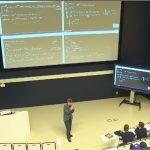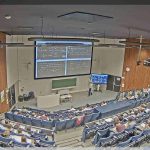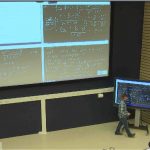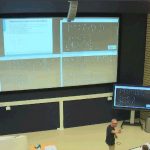Improved Study Results with Advanced Teaching Environment
Chalkboard pedagogy is still going strong within higher education. It makes students clear how reasoning takes place instead of just presenting facts. The instructor simultaneously produce and write arguments in successive order on the board while thinking aloud. This it to visualise the reasoning, students see the process and structure of the step-by-step arguments to recognise patterns and interconnections. At the same time such talking-writing pedagogy loses connection with the contemporary but pressing movement of Open & Online education practices. The direct consequence of online practices is that all is becoming digital. Also the chalkboard should be digitised to build a bridge between campus classes, blended settings and online practices.
In 2012 an advanced teaching system was introduced combining virtual chalk and four parallel video signals, see earlier post on this weblog on April 17, 2014 ‘Advanced Teaching with Virtual Chalk and Four Parallel Video Signals’.
A few pictures to illustrate digital writing in its practice 🙂
 |
 |
 |
 |
 |
 |
 |
 |
 |
Students and instructors were extremely positive, but had their opinions led to better study performances? Now, four years after initiation, study results of three full academic years were analysed and have been delivering interesting results. If we compare our findings with the largest and most comprehensive meta-analysis about undergraduate STEM education [1], which questions the traditional lecturing practice, we have found very competing figures. Although four-quadrant pedagogy is new, it still belongs to what is named lecture setting. How interesting would it be when active elements are added to the four-quadrant pedagogy. Read this paper and be astounded.
[1] Freeman, S., et al. (2014). “Active Learning increases student performance in science, engineering, and mathematics.” PNAS 111(23): 6.





Recent Comments